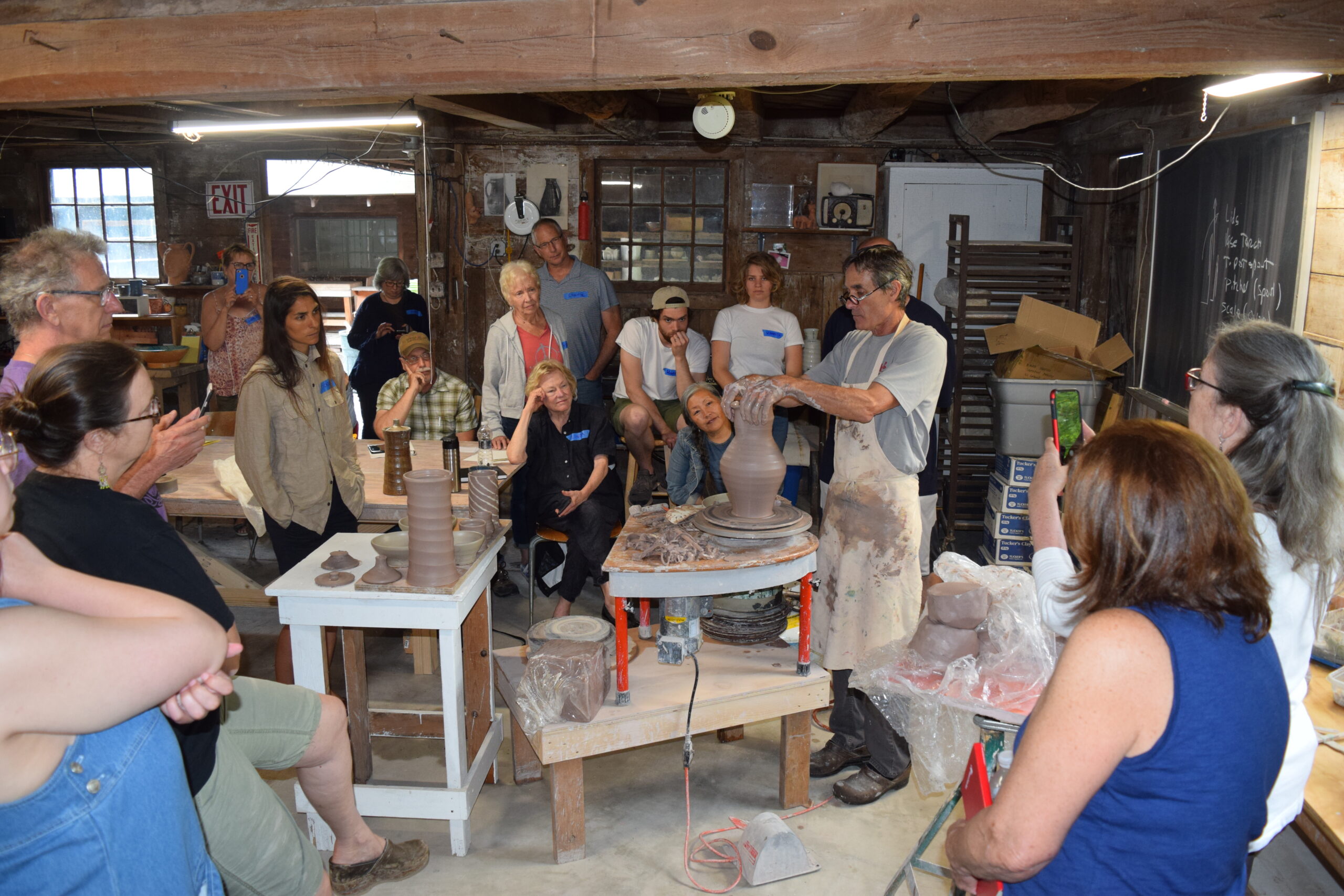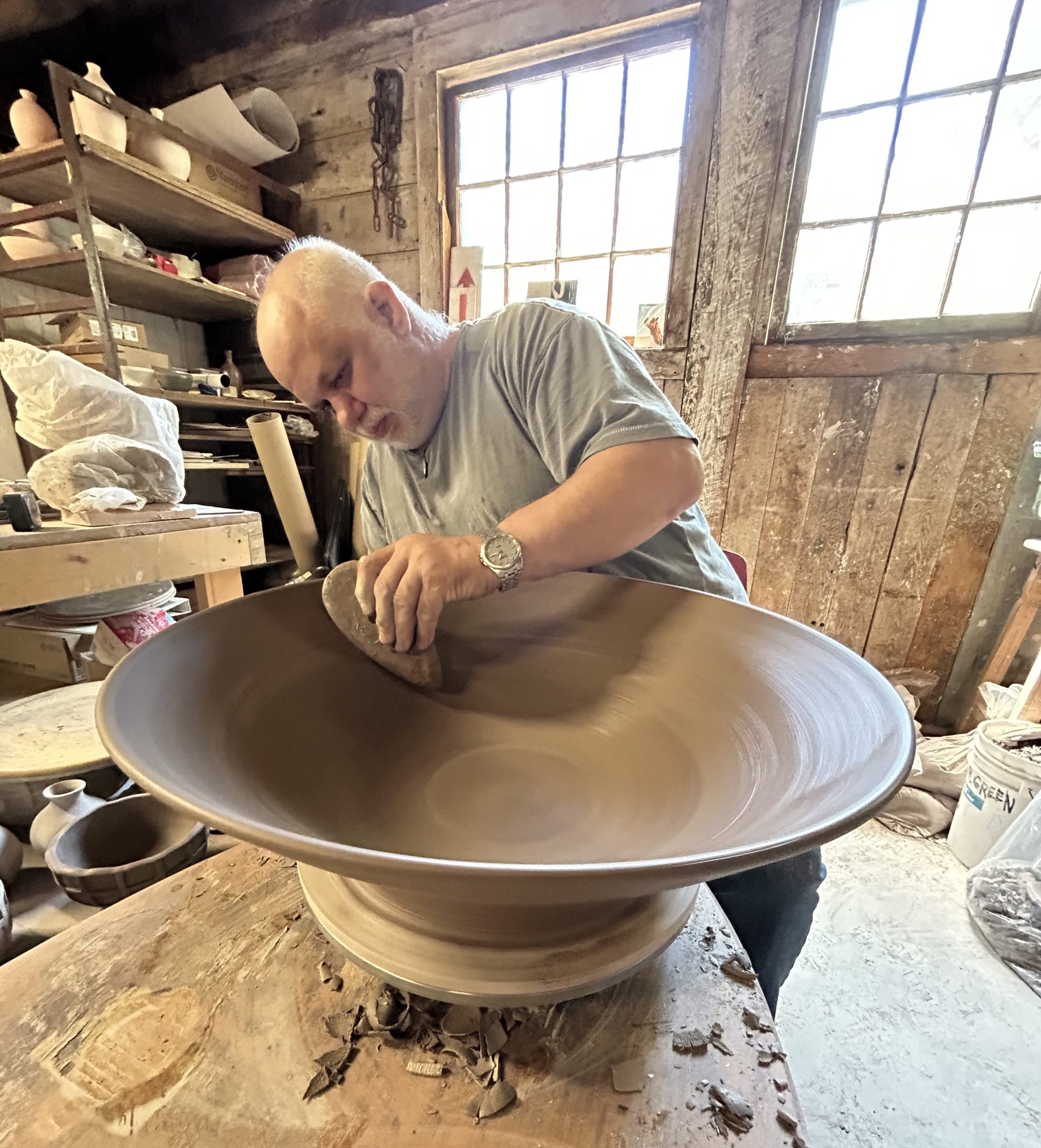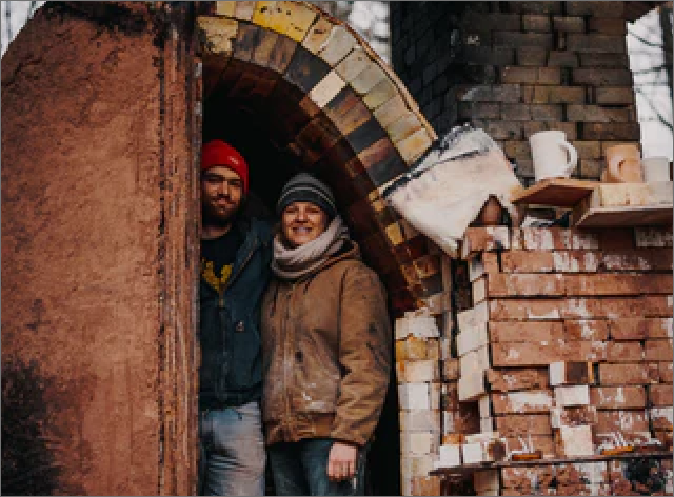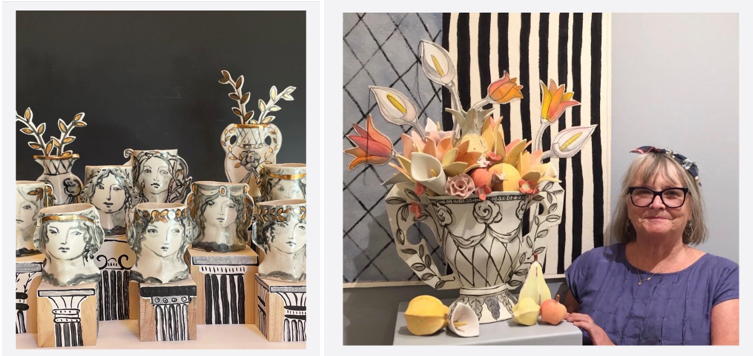The Arts and Crafts Movement and its idealistic philosophy, based on the synthesis of nature, love of craft, and simple living, was the genesis of the Byrdcliffe Colony and remains a living and growing component. The tradition and the future of education is alive and centered at the historic Byrdcliffe Arts Colony.
The tradition and the future of ceramics are alive and centered at the historic Byrdcliffe Barn. Our Ceramics classes take place in the Lower Level of the Byrdcliffe Barn on 485 Upper Byrdcliffe Road, Woodstock, NY.
Beginner and intermediate/ advanced classes are offered in both wheel throwing and handbuilding, and a state-of-the-art kiln is on site.

Drop in on Tuesdays in April during this open session for personal instruction and demonstrations with Ceramics Program Director Rich Conti. Take advantage of open studio time to practice. This session is highly recommended if you are new to wheel throwing or would like to get back in the studio from winter break and begin pottery making.
Take our wheels for a spin in this one-day introduction to pottery. This is a chance to try out your hand at pottery if you are new to working with clay or have been away for some time. We will go over all the steps from preparing clay to centering and how to throw a pot and finishing up with glazing. This one-day pottery 101 introduction will consist of demonstrations and ample time to get your hands in clay. This is an ideal opportunity to see, understand, and experience pottery without committing to a full session. A basic tool kit will be provided; please bring a medium hand towel. After this try-out, we hope you decide to join us for a full session and discover all the satisfaction making your own pottery brings.
FREE, with purchase of individual membership.
Become part of a team which will support our clay community and studio by creating pottery and helping maintain an organized and functioning studio. After our initial making session, we will meet up once a month to discuss and work on projects. This program is open for people who have the desire to volunteer their time and skills to produce and sell handmade pottery, created in the tradition and spirit of a Guild of craftspeople.
To get involved, contact Rich Conti, Ceramics Program Director, at ceramics@woodstockguild.org
This class is geared for beginners, novice, and self-guided individuals. Learn to work on the potter’s wheel or improve the skills you already possess. Beginning students will learn to center clay and understand the basics of throwing pottery. Students with prior knowledge will make cups, bowls, vases, and plates. Students will also learn how to make handles, lids, knobs, and spouts. The work will then be high-fired to 2350 degrees in in gas reduction.
Prior experience is required for this class. Continue to hone that particular form you have been trying to master, or search for new expression in your work. We will continuously work towards improving our skills with explorations in form, design, and texture. The work made will then be high fired to 2350 degrees in gas reduction.
*All students must have previously taken the All-Levels Class.
2024 FOCUSED CLASSES:
LOOSENING UP (session I)
Learn to create pots that have a relaxed quality. This class will encourage you to appreciate pottery that way not be entirely symmetrical. We will also bring this approach to glazing our ware. Keep in mind loose is not sloppy and pots can be precisely skewed.
PORCELAIN (session II)
We will start out working in a light porcelaneous stoneware before transitioning into pure grolleg porcelain. We will learn how to throw paper thin to take advantage of the translucent qualities of porcelain; demonstrations in water etching and underglaze design will be covered. Porcelain gets a bed rap for being difficult to work with, but some find it easier and continue working with this magical material. NOTE: There is an additional studio fee for this class.
ETHICAL POTS | CLARY ILLIAN’S A POTTER’S BOOK (session II)
Oliver Watson coined the term ethical pot to describe a trend in studio pottery that favored plain utilitarian ceramics. Watson said that the ethical pot, “made in the correct way with the correct attitude, would contain a spiritual and moral dimension.” This class will follow the Clary Illian’s workbooks step by step approach making pottery in the Mingei tradition. In the mid-1920s Mingei was seen as a reaction to the rapid industrialization of Japan. This movement in Japanese folk crafts paralleled many of the same ideas of John Ruskin and William Morris. It was Ruskin’s and Morris’s philosophy which inspired the Whitehead’s to create the Byrdcliffe Arts Colony.
PLACE SETTINGS (session IV)
In this class we will make a service set for 4; your approach to pairing plates, bowls, and cups is the goal. Serving pieces will also be encouraged.
Work independently in the ceramics studio on your own projects. Participants must have the basic skills and understanding in the process they choose to work. Independent study allows you use of the ceramic studio 5 days a week up to 3.5 hours a day, Monday through Saturday between 9am – 6pm so long as a class is not taking place in the studio.
Ceramics Program Director, Rich Conti available on Mondays from 10:00 – 11:00 am for feedback and questions.
Classes
Our Ceramics classes with Byrdcliffe Ceramics Director Rich Conti and other guest instructors are offered at the Ceramics studio with morning, afternoon, and evening class options.
Classes fill up quickly. If you are not able to sign up for the class you are interested in, it is full. Call 845.679.2079 to be added to a waitlist.
Class Schedule
For exact dates and times of class offerings, click on the ceramics registration button at the top of the page.
Spring Training: April
Session I: May – June
Session II: July – August
Session III: September – October
Session IV: November – December
Open Studio Policy
Our ceramics studio is open from 8:30 am – 8:30 pm Monday – Saturday. The studio is closed on Sundays. Each registered student may take advantage of the community class room once a day for up to 3 1/2 hours at a time when classes are NOT in session.
Materials and studio fee
Includes up to 50 lbs. of clay and bisque firing of first box of clay. Extra clay and firings after first box have an additional charge. Fee subject to change based on market costs.
Cancelations
There are NO REFUNDS for classes within two weeks of start date. If refunds are issued prior to two-weeks of start date, an administrative fee of $25 will be applied.
Firing Fees/ Kiln
The Woodstock Byrdcliffe Guild will fire ceramic artists’ creations in the kilns (cone 10 gas reduction and up to cone 6 electric kiln firings) at the Byrdcliffe ceramics studio. Firing fees for enrolled students are $0.05 per cubic inch and $0.08 for soda firing. Drop off firings for Byrdcliffe members are $0.06 per cubic inch. To have your work fired and for additional information, send an email to ceramics@woodstockguild.org.
FIRING FEE PAYMENTS – CLICK HERE
Private Lessons
Private lessons are available. Interested in a ceramic class for an individual or for a group of 4-6 family and friends? Please email Ceramics Program Director, Rich Conti directly at ceramics@woodstockguild.org for availability and rates.
What tools to bring to class:
Basic pottery tool kit, medium Terry cloth hand towel, an apron is optional but recommended.
Bailey’s Pottery is a great local resource for tools and supplies. Please note that supply chain issues have been experienced. They try their hardest to get your orders filled. Prepare accordingly.

Harry is largely self-taught. A ceramics artist of the Catskill Mountains of New York, his interest in the history and geology of the region has lead him to explore the potential of local clay, stone, and wood ash as the basic materials from which his pots can be made.












Copyright © 2023 Woodstock Byrdcliffe Guild. All rights reserved.